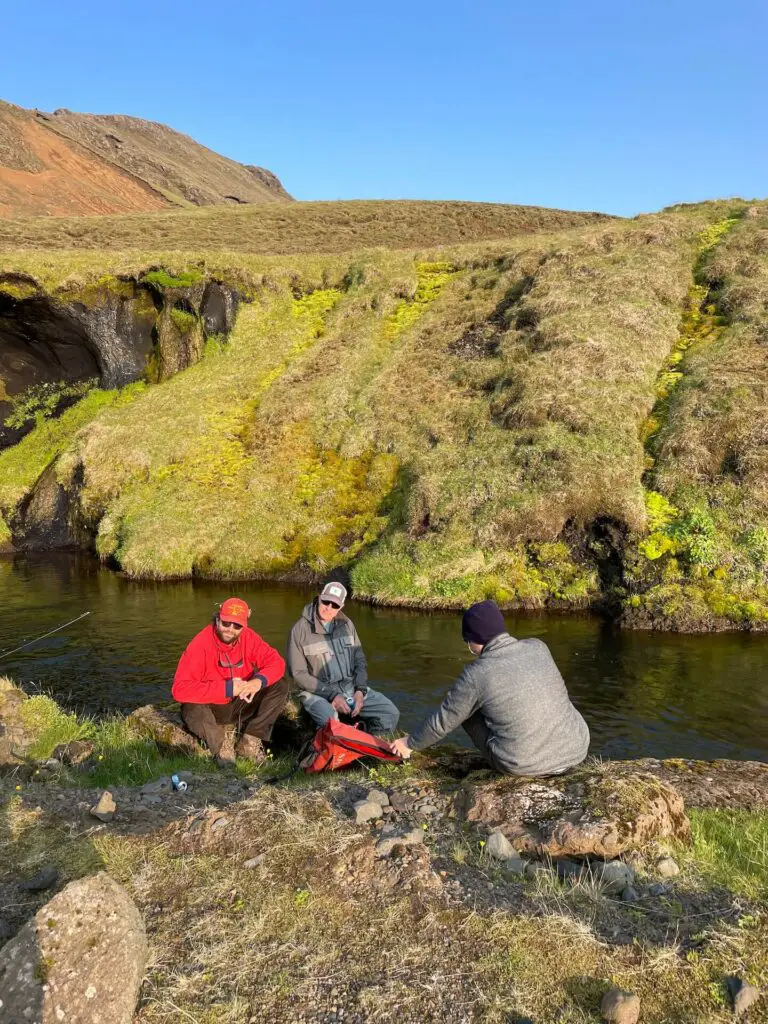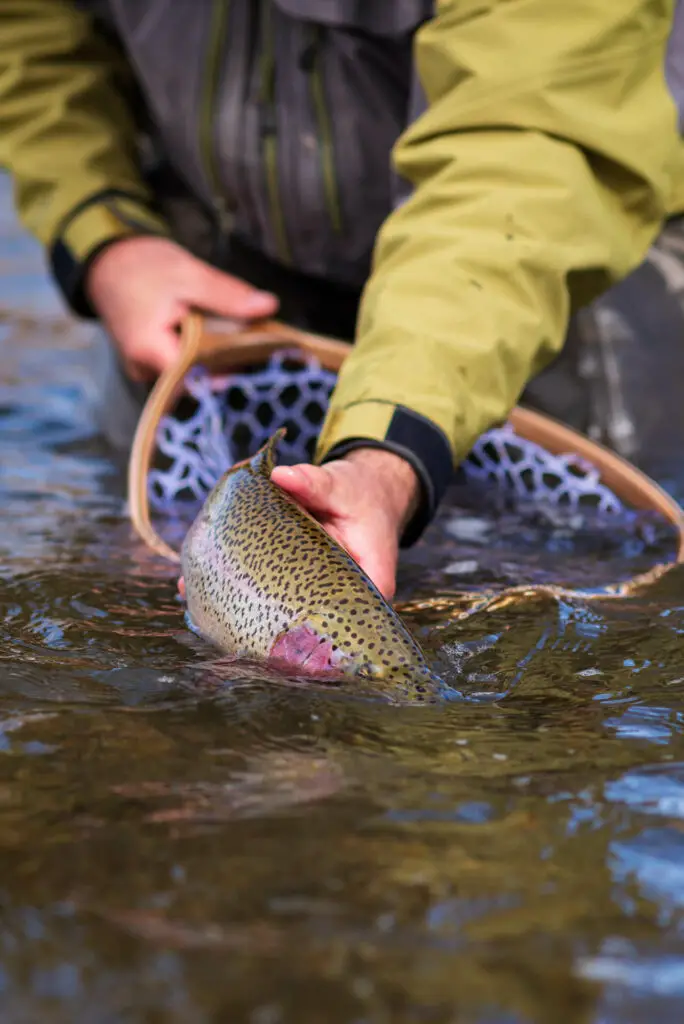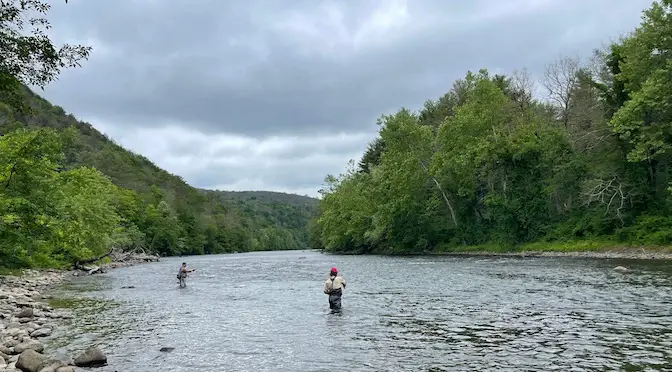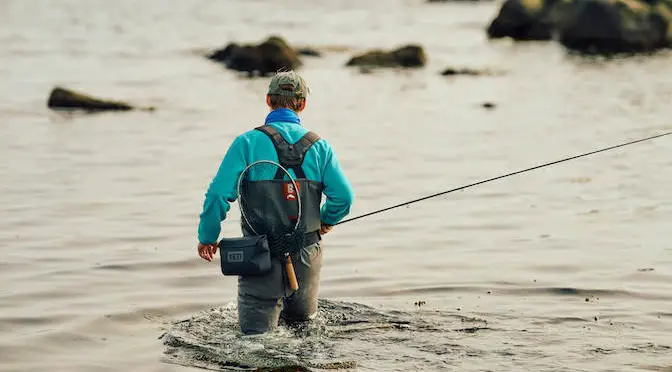Last updated on April 23rd, 2024.
- The Basics of Fly Fishing Etiquette - April 22, 2024
- Fly Fishing Gear Essentials: What You Need to Start - April 18, 2024
- Catch the Calm: Psychological Benefits of Fly Fishing - April 17, 2024
In today’s fast-paced world, finding effective ways to manage stress and support mental health is more important than ever.
Amidst the myriad of potential hobbies and activities that promote relaxation and well-being, fly fishing emerges as a unique and profoundly therapeutic escape. This serene sport not only allows you to connect with nature but also provides substantial psychological benefits, from reducing stress to enhancing mindfulness.
The Calm of the Stream: Nature’s Effect on Mental Health

The setting for fly fishing is usually one of tranquility: rivers, streams, and lakes surrounded by natural beauty. According to studies, spending time in nature can lower blood pressure, reduce anxiety, and decrease stress levels. The soothing sounds of flowing water and the rhythmic motion of casting lines help to calm the mind, offering a meditative-like state. Fly fishing requires a level of focus and presence that draws anglers away from everyday concerns and into the moment, a practice closely aligned with mindful meditation techniques.

A Cast Toward Mindfulness
Mindfulness involves being fully present in the moment, aware of where we are and what we’re doing, without becoming overly reactive or overwhelmed by what’s going on around us. Fly fishing is inherently mindful, demanding attention to the casting technique, the environment, the water’s flow, and the fish’s potential movements. This focus can help quiet the chatter of the mind, allowing practitioners to enjoy a reprieve from the stresses of daily life. The repetitive action of casting and retrieving can serve as a focal point, helping to enhance concentration and promote a peaceful state of mind.

The Challenge That Rewards
Fly fishing is not without its challenges, including mastering the cast, choosing the right flies, reading the water, and understanding fish behaviors. The learning curve itself can be a mental boost. Setting and achieving goals, such as improving casting accuracy or catching a specific type of fish, contributes to improved self-esteem and personal satisfaction. Overcoming these challenges not only makes the sport rewarding but also instills a sense of achievement and confidence.
Social Solitude or Community Connection

While fly fishing can be a solitary activity, providing a precious pause from the demands of social interaction, it also offers opportunities to build community. Whether through guided trips, clubs, or casual gatherings, fly fishing enables connections with others who share similar interests. These social interactions can be particularly beneficial for mental health, offering support and camaraderie without the pressures of more crowded social settings.
Reflection and Resilience
The reflective nature of fly fishing can encourage anglers to think introspectively, pondering life’s larger questions at the pace of a drifting boat. This reflection can lead to greater self-awareness and emotional insight, which are key components of personal resilience. Additionally, the inevitable ups and downs of fishing—days without a catch, battling adverse weather conditions—teach patience and persistence, qualities that are valuable in every aspect of life.
Conclusion

Fly fishing offers much more than the thrill of the catch—it is a therapeutic tool, capable of nurturing the mind and spirit. It teaches patience, persistence, and presence, all while providing a peaceful escape into nature. Whether you’re wading through a mountain stream or casting lines on a quiet lake, the benefits of fly fishing are profound, offering a natural, accessible form of stress relief and mental health therapy. For anyone looking to unplug, unwind, and uplift their spirits, fly fishing might just be the perfect cast.
FAQs on the Psychological Benefits of Fly Fishing
How does fly fishing reduce stress?
Fly fishing promotes relaxation through its rhythmic casting techniques and the natural settings where it is often practiced. Being near water and immersed in nature can significantly lower cortisol levels, the body’s primary stress hormone.
Can fly fishing actually improve mental health?
Yes, engaging in fly fishing can improve mental health by providing an opportunity for mindfulness, which helps in reducing symptoms of anxiety and depression. The focus required in fly fishing helps divert attention from negative thoughts and improves overall emotional wellbeing.
Is fly fishing a good activity for mindfulness practice?
Absolutely. The concentration needed to cast and choose the right fly encourages a present-focused awareness similar to mindfulness practices, which can enhance mental clarity and emotional stability.
What are the social benefits of fly fishing?
Fly fishing can be both a solitary and social sport, offering opportunities to join clubs, participate in group outings, and connect with others who share the same interest, thereby enhancing one’s social network and sense of community.
How often should I go fly fishing to experience its psychological benefits?
The frequency can vary depending on personal schedules, but even occasional trips can provide significant benefits. Regular engagement, such as bi-weekly or monthly outings, may help maintain and enhance the mental health benefits.
Is fly fishing suitable for all ages?
Yes, fly fishing is a low-impact activity that people of almost all ages and abilities can enjoy. It’s excellent for young people learning patience and elders seeking a relaxing hobby.
What should beginners keep in mind when starting fly fishing for mental health?
Beginners should focus on the process rather than perfection. Starting with basic techniques and gradually building skills can help in experiencing the calming effects of fly fishing without the frustration of initial challenges.







